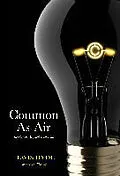In 1963, Martin Luther King, Jr. delivered his famous 'I Have a Dream' speech. Thirty years later his son registered the words 'I Have a Dream' as a trademark and successfully blocked attempts to reproduce these four words. Unlike the Gettysburg Address and other famous speeches, 'I Have a Dream' is now private property, even though some the speech is comprised of words written by Thomas Jefferson, a man who very much believed that the corporate land grab of knowledge was at odds with the development of civil society. Exploring the complex intersection between creativity and commerce, Hyde raises the question of how our shared store of art and knowledge might be made compatible with our desire to copyright everything, and questions whether the fruits of creative labour can - or should - be privately owned, especially in the digital age. 'In what sense,' he writes, 'can someone own, and therefore control other people's access to, a work of fiction or a public speech or the ideas behind a drug?' Moving deftly between literary analysis, history and biography (from Benjamin Franklin's reluctance to patent his inventions to Bob Dylan's admission that his early method of songwriting was largely comprised of 'rearranging verses to old blues ballads, adding an original line here or there... slapping a title on it'), Common As Air is a stirring call-to-arms about how we might concretely legislate for a cultural commons that would simultaneously allow for financial reward and protection from monopoly. Rigorous, informative and riveting, this is a book for anyone who is interested in the creative process.
Autorentext
Lewis Hyde is a poet, essayist, translator and cultural critic. A MacArthur Fellow, Hyde is the Richard. L. Thomas Professor of Creative Writing at Kenyon College and is a Faculty Associate at Harvard’s Berkman Centre for Internet and Society.
Klappentext
In 1963, Martin Luther King, Jr. delivered his famous 'I Have a Dream’ speech. Thirty years later his son registered the words 'I Have a Dream’ as a trademark and successfully blocked attempts to reproduce these four words. Unlike the Gettysburg Address and other famous speeches, 'I Have a Dream’ is now private property, even though some the speech is comprised of words written by Thomas Jefferson, a man who very much believed that the corporate land grab of knowledge was at odds with the development of civil society. Exploring the complex intersection between creativity and commerce, Hyde raises the question of how our shared store of art and knowledge might be made compatible with our desire to copyright everything, and questions whether the fruits of creative labour can - or should - be privately owned, especially in the digital age. 'In what sense,’ he writes, 'can someone own, and therefore control other people’s access to, a work of fiction or a public speech or the ideas behind a drug?’ Moving deftly between literary analysis, history and biography (from Benjamin Franklin’s reluctance to patent his inventions to Bob Dylan’s admission that his early method of songwriting was largely comprised of 'rearranging verses to old blues ballads, adding an original line here or there... slapping a title on it’), Common As Air is a stirring call-to-arms about how we might concretely legislate for a cultural commons that would simultaneously allow for financial reward and protection from monopoly. Rigorous, informative and riveting, this is a book for anyone who is interested in the creative process.
Zusammenfassung
In 1963, Martin Luther King, Jr. delivered his famous I Have a Dream speech. Thirty years later his son registered the words I Have a Dream as a trademark and successfully blocked attempts to reproduce these four words. Unlike the Gettysburg Address and other famous speeches, I Have a Dream is now private property, even though some the speech is comprised of words written by Thomas Jefferson, a man who very much believed that the corporate land grab of knowledge was at odds with the development of civil society. Exploring the complex intersection between creativity and commerce, Hyde raises the question of how our shared store of art and knowledge might be made compatible with our desire to copyright everything, and questions whether the fruits of creative labour can or should be privately owned, especially in the digital age. In what sense, he writes, can someone own, and therefore control other peoples access to, a work of fiction or a public speech or the ideas behind a drug? Moving deftly between literary analysis, history and biography (from Benjamin Franklins reluctance to patent his inventions to Bob Dylans admission that his early method of songwriting was largely comprised of rearranging verses to old blues ballads, adding an original line here or there slapping a title on it), Common As Air is a stirring call-to-arms about how we might concretely legislate for a cultural commons that would simultaneously allow for financial reward and protection from monopoly. Rigorous, informative and riveting, this is a book for anyone who is interested in the creative process.
Titel
Common as Air
Untertitel
Revolution, Art and Ownership
Autor
EAN
9781908526052
ISBN
978-1-908526-05-2
Format
E-Book (epub)
Hersteller
Herausgeber
Genre
Veröffentlichung
08.03.2012
Digitaler Kopierschutz
Adobe-DRM
Anzahl Seiten
352
Jahr
2012
Untertitel
Englisch
Unerwartete Verzögerung
Ups, ein Fehler ist aufgetreten. Bitte versuchen Sie es später noch einmal.
